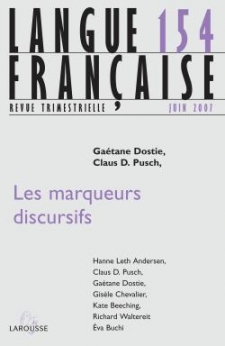
Langue française n° 154 (2/2007)
Pour acheter ce numéro, contactez-nous
Recevez les numéros de l'année en cours et accédez à l'intégralité des articles en ligne.
The English discourse markers – but, so, well, because – have been incorporated into a variety of Acadian French which has developed in southeastern New-Brunswick (Canada) in close contact with English. This paper attempts to explain what has motivated the borrowing of these particular markers into the current system, as opposed to the failure to borrow and and or, or even the markers of opposition and consequence, still and then, which are almost synonymous with but and so. There is a strong body of evidence showing that the markers so and but have largely evicted their homologues in standard French (mais and alors or ça fait que in regional French), while ben (bien) and parce que have maintained their place in the system. The argumentative value of the markers within an utterance and their intersubjective value in turn-taking are borne out by our data, although a few potential counter examples remain to be investigated.

